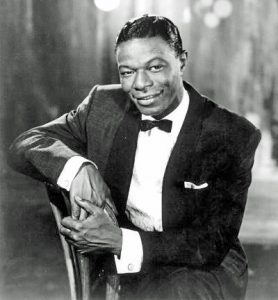
Lights Out: Nat “King” Cole, by Colman Domingo and Patricia McGregor, directed by McGregor. People’s Light Theater, Malvern PA.
Jukebox musicals have become a major genre in the theater world. People’s Light breaks the mold and goes beyond convention with its world premiere about the career of singer Nat “King” Cole.
This is a theatrical original — a surrealistic concept of what might have gone through Cole’s mind as he saw his TV career ended by bigots and cowardly broadcast executives. The 70-minute production includes many songs associated with Cole, but it omits some of his biggest hits because their lyrics contributed nothing to the story line. This, clearly, is the antithesis of a jukebox show.
Nat Cole was famed as a jazz pianist in the late 1930s, and he formed The King Cole Trio which became the top-selling group (and the only black act) on Capitol Records in the 1940s. Starting in 1950 he left the keyboard and became a solo singer billed simply as Nat King Cole (with no quotation marks), purring romantic ballads to mainstream audiences. He was a mild-mannered man whose music was intimate, smooth and sophisticated.
He was subjected to racial discrimination when he moved his family into a white neighborhood and he was beaten at a concert in Alabama, but he avoided public statements. Jazz lovers criticized him for going mainstream, and some civil rights activists faulted him for not being outspoken. The writers of this show suggest that his docile public persona masked a suppressed inner rage, and they contrast Cole’s mild manner with the aggressive personality of Sammy Davis Jr., who appears as an imaginary alter ego.
In 1956 Cole became the first African-American host of a network television series that ran until December 1957. A constant smoker, he was diagnosed with lung cancer in December 1964. Two months later, he died of it at the age of 45.
Cole is played sympathetically by Dulé Hill, who resembles him and who does an excellent imitation of Cole’s husky voice, with his characteristic careful enunciation. Davis is impersonated by Daniel Watts who doesn’t exactly look like Davis but does capture his frenetic hyperactivity. The two of them provide the show’s climax when Davis challenges Cole to let loose and they perform an energetic challenge dance.
Attendees should not take this show literally. This is all surrealism. There’s no record that Davis ever appeared on Cole’s TV show. And Nat Cole was not a dancer. You must put aside the fact that Davis himself didn’t always lead on black issues; he fawned when his pal Frank Sinatra made racial jokes. In Davis’s defense, he knew that Sinatra had a strong record on racial issues and probably assumed that “everyone” knew that Frank was “just kidding.” But the contrast of a brash Davis and a quiet Cole is powerfully theatrical.
The action is set in a TV studio and dressing room on December 17, 1957, the date of Cole’s last broadcast. Clint Ramos’s set design and Katherine O’Neill’s costumes are excellent. The script builds tension as it highlights the many slights which Cole endured because of his race. Characters mouth words that Cole imagines are in their minds, although they actually never spoke them. And a “decency” yardstick is used to prevent Cole from coming too close to white female guests. (I remember the furor when Cole momentarily touched a white woman on TV!)
Superb contributions come from Gisela Adisa as Eartha Kitt and Natalie Cole, Rachael Duddy as Betty Hutton and Peggy Lee, Zonya Love as Nat’s mother, Dayshawn Jacobs as young Nat and as Billy Preston, and Jo Twiss, Marc D. Donovan and Owen Pelesh as broadcast flunkies. Fine choreography is by Jared Grimes. John McDaniels arranged the music and composed one new song, while Ryan Slatko leads the small band.
All in all, this work-in-progress is great imaginative theater.
Below, Nat Cole:
